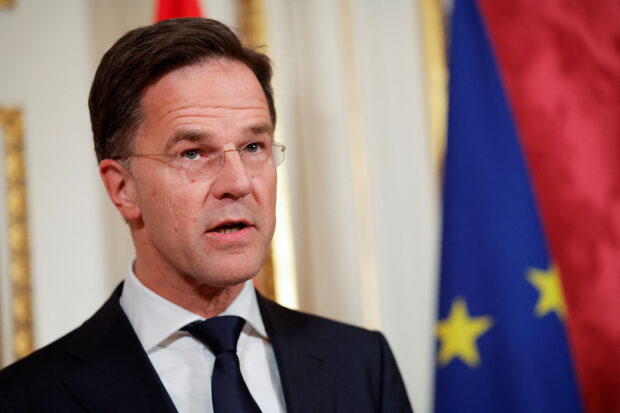What’s next for the Dutch after government falls?

FILE PHOTO: Dutch Prime Minister Mark Rutte speaks at a news conference with French President Emmanuel Macron (not pictured) during Macron’s state visit to the Netherlands, in Amsterdam, Netherlands April 12, 2023. REUTERS/Piroschka van de Wouw/File Photo
The Hague, Netherlands — The Dutch coalition government led by Prime Minister Mark Rutte has collapsed in an argument over migration, triggering snap elections.
Here are the key questions about the fall of the four-party coalition after just a year and a half, what happens next, and what it means for Europe:
Why did it fall?
The Netherlands, like other countries in Europe, has been looking for ways to rein in the number of migrants, particularly as more people try to cross the Mediterranean.
The issue has particularly vexed the Dutch four-party coalition — Rutte’s center-right VVD, its ideological bedfellows the CDA, the center-left D66 and the ChristenUnie Christian democratic party.
Last year the Netherlands faced a major scandal over overcrowded migration centers in which a baby died and in which hundreds of people were forced to sleep in the open. Rutte vowed to take action on the “shameful situation”.
Article continues after this advertisementDutch media reported that Rutte suddenly this week pushed a demand that the number of relatives of war refugees allowed into the Netherlands be capped at 200 per month.
Article continues after this advertisementThe ChristenUnie in particular — calling itself a family party — opposed the plan, along with D66.
Dutch media have debated why Rutte appeared to be so ready to torpedo his own coalition — the most likely answer appearing to be tensions within his own party over migration.
What next?
The Dutch electoral commission has said the earliest elections can be held is November, due to electoral rules, the summer holidays and the need to give parties time to campaign.
It will be the second election in just over two years for the Netherlands, which has a complicated multiparty system that often produces unstable coalitions.
The last elections in April 2021 were then followed by a record-breaking 271 days of coalition negotiations, with Rutte’s fourth coalition since 2010 taking office in January 2022.
Who is likely to do well?
All eyes are on the upstart Farmer-Citizen Movement (BBB), which has ridden on the back of farmer-led protests against government plans to cut livestock numbers to reduce environmental damage and emissions.
The party came out of nowhere four years ago to win the most seats in senate elections earlier this year. Its leader Caroline van der Plas said on Friday that the “banners and flags are still in the shed”.
The Dutch far-right led by bleached blonde anti-Islam politician Geert Wilders and his PVV Freedom Party have long been a force in Dutch politics, even if their showing in 2021 was less than before.
But current coalition partners the CDA, led by Foreign Minister Wopke Hoekstra and D66 led by Finance Minister Sigrid Kaag face a potential wipeout at the polls this time around, Dutch media said.
Can Rutte win a fifth term?
Rutte’s political survival skills have earned him the nickname “Teflon Mark” because scandals have slid off him like the non-stick pan coating.
But as Dutch broadcaster RTL said: “The problem is: who still wants to govern with Rutte?”
His current coalition partners have criticised him
And Van der Plas of the farmer’s party has vowed never to join a coalition with Rutte in it.
If the BBB does well enough in the elections to demand a place in a coalition, Rutte’s VVD could be tempted to ditch him to keep its place at the head of the government.
What does it mean for Europe?
The Netherlands, as so often before, could be a canary in the coal mine for other European administrations.
The EU is mired in disagreement on how to handle the thousands of migrants heading for the continent, which has fuelled support for far-right and nationalist parties.
Spain’s far right Vox party is on the rise ahead of elections next month.
Italy is led by hard-right Prime Minister Giorgia Meloni — with whom Rutte visited Tunisia last month.